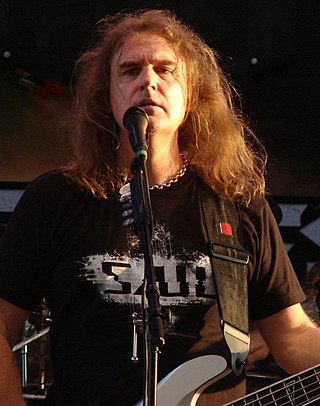Related Research Articles

Metallica is an American heavy metal band. The band was formed in 1981 in Los Angeles by vocalist and guitarist James Hetfield and drummer Lars Ulrich, and has been based in San Francisco for most of its career. The band's fast tempos, instrumentals and aggressive musicianship made them one of the founding "big four" bands of thrash metal, alongside Megadeth, Anthrax and Slayer. Metallica's current lineup comprises founding members and primary songwriters Hetfield and Ulrich, longtime lead guitarist Kirk Hammett and bassist Robert Trujillo. Guitarist Dave Mustaine, who formed Megadeth after being fired from Metallica, and bassists Ron McGovney, Cliff Burton and Jason Newsted are former members of the band.

Megadeth is an American thrash metal band formed in Los Angeles in 1983 by vocalist/guitarist Dave Mustaine. Known for their technically complex guitar work and musicianship, Megadeth is one of the "big four" of American thrash metal along with Metallica, Anthrax, and Slayer, responsible for the genre's development and popularization. Their music features complex arrangements and fast rhythm sections, dual lead guitars, and lyrical themes of war, politics, religion, death, and personal relationships.

Killing Is My Business... and Business Is Good! is the debut studio album by American thrash metal band Megadeth, released on June 12, 1985, by Combat Records. At the beginning of 1985, the band was given $8,000 by Combat to record and produce its debut album. The band was forced to fire their original producer and produce the album by themselves, after spending half of the album's budget on drugs, alcohol, and food. Despite the poor production, the album was a well-received effort that obtained strong reviews in various music publications. Killing Is My Business... and Business Is Good! played an essential role in establishing thrash metal as an authentic subgenre of heavy metal music. It explores themes of death, occultism, and violence.

Peace Sells... but Who's Buying? is the second studio album by American thrash metal band Megadeth, released on September 19, 1986, through Capitol Records. The project was originally handled by Combat Records, resulting in the original mix of the album being co-produced by Randy Burns. Capitol Records then bought the rights to the album and hired another producer named Paul Lani to mix it himself. The recording of the album was difficult for the band, because of the ongoing drug issues the members had at the time. Drummer Gar Samuelson and guitarist Chris Poland were fired shortly after the album's promotional tour for drug abuse, making Peace Sells Samuelson's last Megadeth album. Poland reappeared as a session musician on Megadeth's 2004 album The System Has Failed. The title track, noted for its politically conscious lyrics, was released as the album's second single and was the band's first music video. The album's cover art, featuring the band's mascot Vic Rattlehead in front of a desolated United Nations Headquarters, was created by Ed Repka.

David Scott Mustaine is an American musician. He is the co-founder, frontman, primary songwriter and sole consistent member of the thrash metal band Megadeth. Mustaine has released sixteen studio albums with Megadeth, sold over 38 million records worldwide, with six albums platinum-certified, and won a Grammy Award for Best Metal Performance in 2017 at the 59th Grammy Awards, for the title track of their fifteenth studio album, Dystopia.

Davonté War Elf-son is an American musician, best known for his long tenure as the bassist for thrash metal band Megadeth.

Clifford Lee Burton was an American musician who was the bassist for thrash metal band Metallica from 1982 until his death in 1986. He performed on the band's first three albums, Kill 'Em All (1983), Ride the Lightning (1984), and Master of Puppets (1986). Burton also received a posthumous writing credit on ...And Justice for All (1988) for the song "To Live Is to Die".

Kill 'Em All is the debut studio album by the American heavy metal band Metallica, released on July 25, 1983, through the independent label Megaforce Records. After forming in 1981, Metallica began by playing shows in local clubs in Los Angeles. They recorded several demos to gain attention from club owners and eventually relocated to San Francisco to secure the services of bassist Cliff Burton. The group's No Life 'til Leather demo tape (1982) was noticed by Megaforce label head Jon Zazula, who signed them and provided a budget of $15,000 for recording. The album was recorded in May with producer Paul Curcio at the Music America Studios in Rochester, New York. It was originally intended to be titled Metal Up Your Ass, with cover art featuring a hand clutching a dagger emerging from a toilet bowl. Zazula convinced the band to change the name because distributors feared that releasing an album with such an offensive title and artwork would diminish its chances of commercial success.

James Alan Hetfield is an American musician. He is the lead vocalist, rhythm guitarist, co-founder, and a primary songwriter of heavy metal band Metallica. He is mainly known for his intricate rhythm playing, but occasionally performs lead guitar duties and solos both live and in studio. Hetfield co-founded Metallica in October 1981 after answering an advertisement by drummer Lars Ulrich in the Los Angeles newspaper The Recycler. Metallica has won nine Grammy Awards and released 11 studio albums, three live albums, four extended plays, and 24 singles. Hetfield is often regarded as one of the greatest heavy metal rhythm guitar players of all time.

Chris Poland is an American guitarist, best known as the former guitarist of the thrash metal band Megadeth. Since 2002, Poland has been the guitarist of the instrumental rock/jazz fusion bands OHM and OHMphrey, among others, and has appeared on several projects and albums from a variety of different genres.

Gary Charles "Gar" Samuelson was an American musician best remembered for being the drummer for thrash metal band Megadeth from 1984 to 1987, contributing to their first two albums, Killing Is My Business... and Business Is Good! (1985) and Peace Sells... but Who's Buying? (1986). He is considered one of the most influential drummers of thrash metal, having pioneered the incorporation of jazz fusion into the subgenre.
Ronald J. McGovney is an American semi-retired musician, best known as the original bass guitarist in the thrash metal band Metallica from October 1981 to December 1982.

"Jump in the Fire" is a song by American heavy metal band Metallica. It was released as the second and final single from their debut album, Kill 'Em All. The single was accompanied by fake live performances of "Phantom Lord" and "Seek & Destroy" which were alternate studio recordings with sounds of a crowd overdubbed in.

Metal Forces is a British publication founded in 1983 which promotes the music genres heavy metal and hard rock. Metal Forces was well known for its coverage of unsigned bands through its Demolition feature and championed the likes of Metallica, Slayer, Megadeth, HellsBelles, Overkill, Death and Poison long before they had secured record deals. They are credited as contributing in this fashion to the success of the band Anacrusis. Dave Reynolds, a former writer for Metal Forces, has claimed that the magazine was the first to coin the terms thrash metal and death metal. A Metal Forces compiled vinyl album, Demolition – Scream Your Brains Out!, based on the magazine's popular Demolition column, was released in 1988 through Chain Reaction Records featuring Anacrusis, Atrophy, Hobbs' Angel of Death, Aftermath and the Chris Barnes fronted Leviathan. In addition to metal acts, the magazine also featured interviews with alternative rock acts such as Nirvana.

"Hangar 18" is a song by American thrash metal band Megadeth from their 1990 studio album Rust in Peace. The song was inspired by a mythical building purportedly located at Wright-Patterson Air Force Base near Dayton, Ohio, where an alien spacecraft or bodies were supposedly stored. The song reached number 25 on the Irish Singles Chart, also reached number 26 on the UK Singles Chart.

Metal Massacre is a series of compilation albums released through Metal Blade Records. It is famous for "shedding light" on bands such as The Obsessed, Trouble, Overkill, Metal Church, Metallica, Slayer, Virgin Steele, Hellhammer, Voivod, Armored Saint, Lizzy Borden, Possessed and more.

William Lee Rauch was an American drummer who played in several thrash metal bands based in California from 1983 to 1987.
"Set the World Afire" is a song by the American thrash metal band Megadeth. It is the second track from their third studio album, So Far, So Good... So What!, which was released in 1988 by Capitol Records.
References
- ↑ CMJ Network, Inc (February 11, 2002). "Loud Rock". CMJ New Music Report : 45. Retrieved November 24, 2013.
- ↑ "Killing Is My Business.. and Business Is Good! - Review". metal-archives.com.
- 1 2 "Dave's band Panic?". Megadeth.com. August 27, 2007. Archived from the original on July 6, 2012.
- ↑ "THE MECHANIX". Metallica.com. Retrieved August 1, 2023.
- ↑ Brannigan, Paul (September 20, 2022). "Megadeth's Killing Is My Business: hamburgers, heroin and one of metal's greatest debut albums". Metal Hammer . Retrieved August 4, 2023.
- ↑ Gelsani, Michelle (March 3, 2015). "Metallica unearths 1982 demo tape No Life 'til Leather for first-ever commercial release". Consequence . Retrieved August 2, 2023.
- ↑ "DAVE MUSTAINE: The Story Behind METALLICA's 'The Four Horsemen'". Blabbermouth.net. August 15, 2011. Retrieved August 3, 2023.
- ↑ Payne, Chris (March 3, 2015). "Metallica to Reissue Early Cassette on Record Store Day". Billboard . Retrieved July 31, 2023.
- ↑ Polcaro, Rafael (September 4, 2018). "Great Forgotten Songs #71 – Megadeth "Mechanix"". Rock And Roll Garage. Retrieved July 19, 2023.
- ↑ Grow, Kory (January 11, 2017). "Megadeth's Dave Mustaine: My Life in 15 Songs". Rolling Stone. Retrieved August 2, 2023.
- ↑ Pementel, Michael (August 23, 2022). "Dave Mustaine Tells Joe Rogan What 'Bothered' Him The Most About Getting Kicked Out Of Metallica". We Are The Pit. Retrieved August 31, 2022.
- ↑ Uhelszki, Jaan (September 11, 2008). "Metallica Week: Kirk Hammett interview". MusicRadar. Archived from the original on July 2, 2015. Retrieved June 7, 2015.
- ↑ Kill 'Em All liner notes. Megaforce Records. 1983.
- ↑ "DAVE MUSTAINE On Winning First GRAMMY: 'Good Thing Is It Didn't Say 'METALLICA' On The Freakin Award". Blabbermouth.net . March 2, 2018. Retrieved March 11, 2024.
- ↑ Liebler, Raizel. "Loud Moments in Metal Law History: The Four Horsemen v. Mechanix". The Learned Fangirl. Retrieved August 31, 2022.
- ↑ "Megadeth's Dave Mustaine interview 20th February 1984". YouTube . October 30, 2008. Retrieved March 11, 2024.
- ↑ "Metallica Song Catalog: The Mechanix". www.metallica.com.
- ↑ Munro, Scott (September 20, 2022). "Dave Mustaine blames Lars Ulrich for No Life 'Til Leather delay". Metal Hammer . Retrieved March 11, 2024.
- ↑ Stewart-Panko, Kevin (July 14, 2022). "The top 20 best Megadeth songs ranked". Metal Hammer . Retrieved August 29, 2022.
- ↑ Titus, Christina. "The 15 Best Megadeth Songs: Critic's Picks". Billboard. Retrieved August 29, 2022.
- ↑ Killing Is My Business... and Business Is Good! liner notes (2002 reissue). Loud Records. 2002. pp. 2, 7–8.
- ↑ "Megadeth MECHANIX". Megadeth.com. Retrieved August 31, 2022.